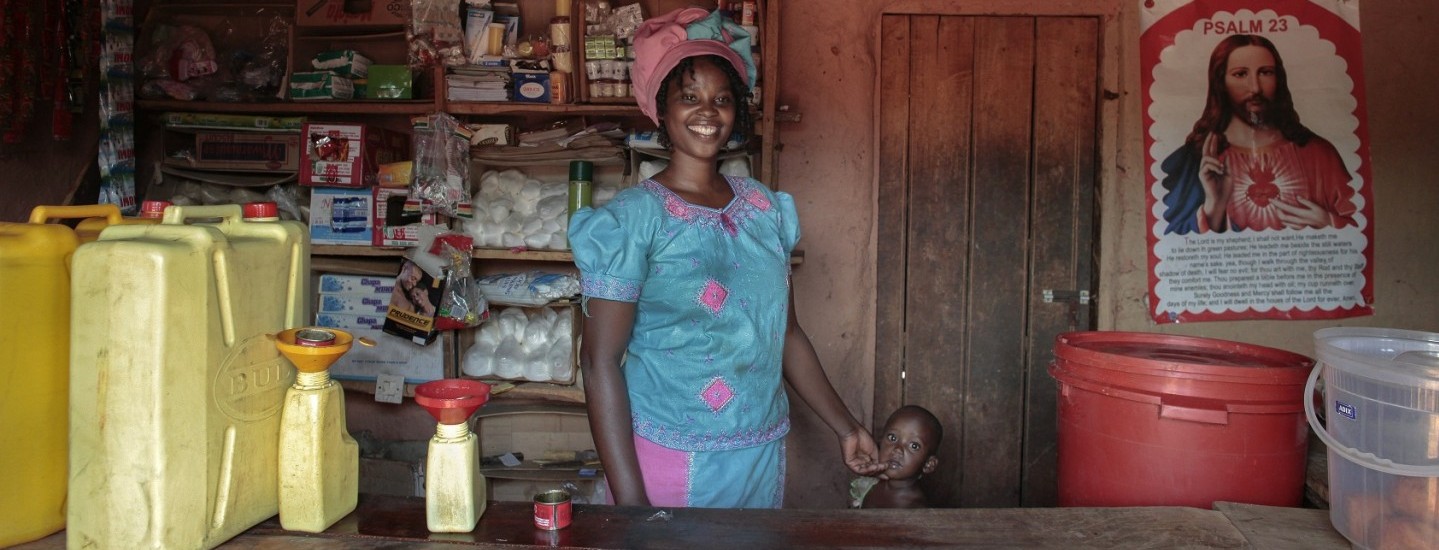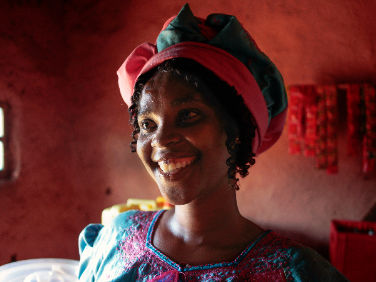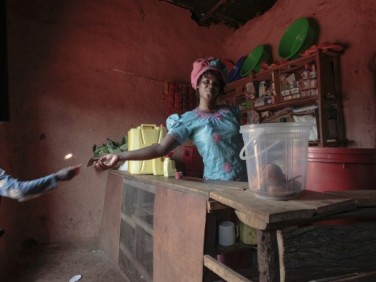
Business as usual: Clementine’s climb from farmer to leader
It started with a pig. Then Clementine Uwimana traded up and rented out a shop. Next, she plans to build a new house with a shelter for a cow. And after that – “I am confident that any challenge I face I can solve,” she says.
Clementine’s rise from subsistence farmer to business owner and local community leader began in 2001, when she joined a local village savings group organised by Hand in Hand partner CARE.
 Credit is nonexistent in Clementine’s native Kabarondo, an isolated village almost 35 miles from Kigali. Skills and business training, also provided to the group, are equally unheard of (countrywide, secondary school enrolment is only 28 percent). Across the district, nearly 50 percent of Clementine’s neighbours are defined as poor. Homes are typically built out of mud and tree trunks. And less than 10 percent of people have access to electricity.
Credit is nonexistent in Clementine’s native Kabarondo, an isolated village almost 35 miles from Kigali. Skills and business training, also provided to the group, are equally unheard of (countrywide, secondary school enrolment is only 28 percent). Across the district, nearly 50 percent of Clementine’s neighbours are defined as poor. Homes are typically built out of mud and tree trunks. And less than 10 percent of people have access to electricity.
Rwanda has come an incredibly long way since the 1994 genocide claimed some 800,000 lives. According to the World Bank’s 2017 ‘Doing Business’ report, the country is now the 56th best in the world in terms of overall ease of doing business, ranking second in Africa behind only Mauritius. Still, the east African country has an immeasurably long way to go: more than 80 percent of the working population remains engaged in agriculture, many at the subsistence level, while some 29 percent of Rwandans are considered undernourished by the International Food Policy Research Institute.
Kabarondo, Rwanda
Open for business
In a place like Kabarondo, belonging to a savings group can make all the difference. “The trainer gave me the training and confidence to take a loan of 35,000 Rwandan francs (US $35),” says Clementine.
“I am confident that any challenge I face I can solve”
The 30-year-old used the loan to buy a pig, which she later sold for 70,000 RWF (US $100). The money was enough to pay off her loan and invest in stock for her shop, which today sells everything from beans and charcoal to potatoes and cabbages that Clementine grows herself. With the 2,500 RWF (US $4) she earns in profit each day, Clementine has begun to make a more comfortable life – literally.
“I have bought a mattress and a bed,” she says. “And because important people come to visit me I have also bought cups and plates.” Her most recent purchase, corrugated iron for the roof of her house, stands in the corner of the shop waiting to be installed.
A bright future
 Lately, Clementine’s shop has become more than a place to buy goods, doubling as a buzzing gathering place.
Lately, Clementine’s shop has become more than a place to buy goods, doubling as a buzzing gathering place.
“Most of the problems the women face in the village are discussed in my shop. Local government officials also come to visit me and discuss ideas to improve the community,” says Clementine. Of course, her decision to brew and sell sorghum, a local beer, hasn’t hurt either. As Kabarondo’s leading retailer, she is hopeful about the future. “I am happy. If I work hard I can get everything I want.”
Clementine’s results
![]()
2,500 RWF (US $4) profit per day
![]()
Planning to build a new house
![]()
Newfound influence in the local community
Hand in Hand Eastern Africa and CARE Rwanda are co-operating to empower some 100,000 Rwandans, mostly women, to work their way out of poverty by running their own sustainable businesses. The three-year, US $3.2 million partnership is grounded in our shared belief in the power of entrepreneurship to fight poverty.
Next case study: Meet Maida, the supercharged entrepreneur
